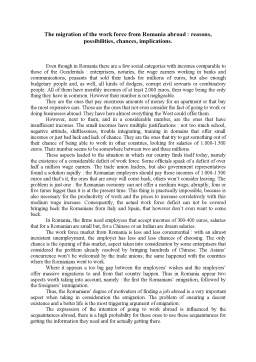Extras din referat
Even though in Romania there are a few social categories with incomes comparable to those of the Occidentals : enterprisers, notaries, the wage earners working in banks and communications, peasants that sold their lands for millions of euros, but also enough budgetary people and, as well, all kinds of dodgers, corrupt civil servants or combinatory people. All of them have monthly incomes of at least 2.000 euros, their wage being the only thing they have in common. However their number is not negligeable.
They are the ones that pay enormous amounts of money for an apartment or that buy the most expensive cars. Those are the ones that not even consider the fact of going to work or doing businesses abroad. They have here almost everything the West could offer them.
However, next to them, and in a considerable number, are the ones that have insufficient incomes. The small incomes have multiple justifications : not too much school, negative attitude, shiftlessness, trouble integrating, training in domains that offer small incomes or just bad luck and lack of chance. They are the ones that try to get something out of their chance of being able to work in other countries, looking for salaries of 1.000-1.500 euros. Their number seems to be somewhere between two and three millions.
These aspects leaded to the situation in which our country finds itself today, namely the existence of a considerable deficit of work force. Some officials speak of a deficit of over half a million wage earners. The trade union leaders, but also government representatives found a solution rapidly : the Romanian employers should pay those incomes of 1.000-1.500 euros and that’s it, the ones that are away will come back, others won’t consider leaving. The problem is just one : the Romanian economy can not offer a medium wage, abruptly, four or five times bigger than it is at the present time. This thing is practically impossible, because is also necessary for the productivity of work and the prices to increase correlatively with this medium wage increase. Consequently, the actual work force deficit can not be covered bringing back the Romanians from Italy and Spain, that however don’t even want to come back.
In Romania, the firms need employees that accept incomes of 300-400 euros, salaries that for a Romanian are small but, for a Chinese or an Indian are dream salaries.
The work force market from Romania is less and less concurrential : with an almost inexistent unemployment, the employer has less and less chances of choosing. The only chance is the opening of this market, aspect taken into consideration by some enterprisers that considered the problem already resolved by bringing hundreds of Chinese. The Asians’ concurrence won’t be welcomed by the trade unions; the same happened with the countries where the Romanians went to work.
Where it appears a too big gap between the employees’ wishes and the employers’ offer massive migrations to and from that country happen. Thus in Romania appear two aspects worth taking into account, namely : the first the Romanians’ emigration, followed by the foreigners’ immigration.
Thus, the Romanians’ degree of motivation of finding a job abroad is a very important aspect when taking in consideration the emigration. The problem of ensuring a decent existence and a better life is the most triggering argument of emigration.
The expression of the intention of going to work abroad is influenced by the acquaintances abroad, there is a high probability for these ones to use these acquaintances for getting the information they need and for actually getting there.
There are also reasons because of which the Romanians hesitate leaving and those first and foremost refer to the fact that they are afraid their family will fall apart after they leave, but they are also afraid that it won’t be easy to find a job abroad either.
The ones that look for a job in one of the countries members of the European Union are based on the informal networks (77,4%) – relatives, friends, acquaintances, etc., in the detriment of the institutions specially designed with the administration of emigration. According to the ANBCC study, the ones that intend to work outwards are preponderantly young, unmarried persons, with incomes slightly over the medium, active on the Romanian work force market.
Coming to face up these realities without an immediate remedy, EQF or The European Qualification Framework will simplify the access on the work market in the European Union. Practically, this one will tie the individual systems of qualification from the states that are members, functioning as a translation apparatus. In this way, the qualifications obtained in a communitary country will become easier to understand for both the employers and the employees.
Preview document
Conținut arhivă zip
- The Migration of The Work Force from Romania Abroad - Reasons, Possibilities, Chances, Implications.doc









